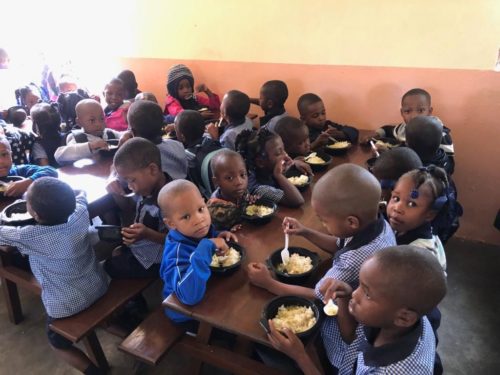
FLATBUSH — The violence that has been rocking Haiti for weeks is being watched warily by Haitian-American Catholics in the Diocese of Brooklyn.
“Unfortunately, there doesn’t seem to be a clear plan or leadership. So nobody knows how this is going to stop,” Auxiliary Bishop Guy Sansaricq, director of the Flatbush-based National Center of the Haitian Apostolate, or NCHA, said.
“It’s complete disorder, and unsafe to go to Haiti; the bishops have indicated there must be change,” he said.
On Oct. 8, the Haitian bishops’ peace and justice commission called for President Jovenel Moise to resign. Moise has been accused of an embezzlement scheme in which $2.3 billion disappeared in a program to buy cheap oil from Venezuela. The accusations have prompted violent protests in Haiti, and local Haitian-Americans are concerned.
Sister Juvenia Joseph, F.D.M., a member of the Congregation of the Daughters of Mary, an order that helps coordinate NCHA events, has relatives and fellow Daughters of Mary who live in Port-au-Prince, Haiti’s capital.
“They are living in fear of being attacked,” Sister Juvenia said. “It’s stressful for them; they don’t have enough food or water … Haitian nationals and those overseas must come together to organize. It’s important to know we are not isolated.”
Sister Juvenia commended the Haitian bishops’ response.
“Sometimes, people need the voice of the church to say something,” she said. “The problem is that we are in suspense, we don’t know what’s going on … and if it goes on too long, people will starve. They will die.”
About 156,000 Haitians live in New York City, according to the American Community Survey, and the NCHA ministers to Haitian Catholic immigrants through social services, retreats, annual conventions, and social and spiritual events. It has a national newsletter as well as a television and radio station, that connects Haitian immigrants across the United States, giving them a forum to discuss how to help people in their native country.
Marie Dominique Maisel, a parishioner at St. Jerome’s in Flatbush, helped start a local shelter for homeless and disabled children in Port-au-Prince. She sends goods and funds to the center whenever she can.
Marie Calixte Labbe, president of the New York chapter of Haitian nonprofit Fraternité Valléenne, said that the organization raised $1,200 in September to support local schools suffering from food shortages.
Labbe, a parishioner at Immaculate Conception, Jamaica, said that the most important thing is finding common ground.
“It is a terrible situation. The people are right to be angry… but we have to channel our anger properly,” she said.
The situation in Haiti — which is still suffering from an earthquake in 2010 — is dire. The recent violence has claimed at least 20 lives and has damaged the economy of an already impoverished country.
In an editorial of the NCHA’s newsletter, editor Buteau “Tob” Espiegle, a local Catholic, called on religious and political leaders to “speak clearly” against the chaos and to “openly support the demands” of Haitians.
“We strongly condemn the massacres perpetrated against the civilian population that continues to protest against corruption, the economic immorality, as well as Mr. Moise and his government … Catholic Bishops of Haiti asked this question in their text: Is there a more atrocious violence than living constantly in insecurity? Is there worse than the misery that takes away all hopes? The bishops continued to ask the politicians and Mr. Jovenel Moise in the first place to assume their responsibilities,” Espiegle wrote.
“It is a duty of conscience to assist Haiti out of this crisis. The opposition leaders should sit together in the interest of the Haitian people and seek together a way out of this mess.”
